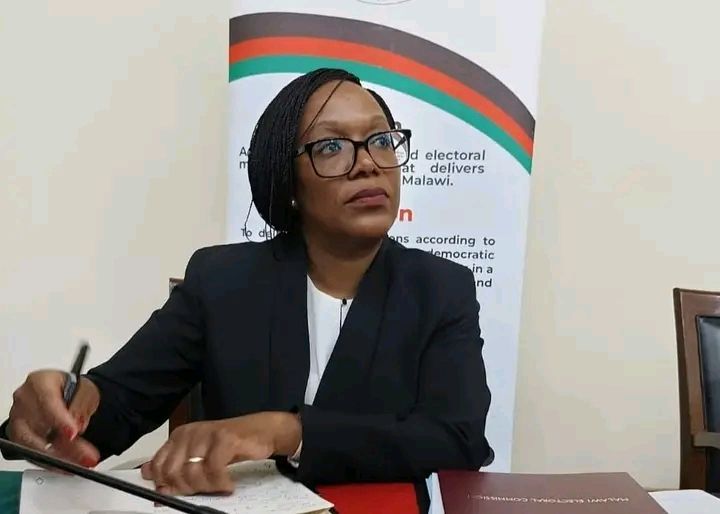By Twink Jones Gadama
The Malawi Electoral Commission (MEC) plays a pivotal role in ensuring free, fair, and credible elections in Malawi. As the body responsible for overseeing the electoral process, the integrity and impartiality of its leadership are paramount. In this context, calls for the resignation of MEC Chair Anabel Mtalimanja is not only justified but necessary for the health of Malawi’s democracy. This narrative will explore the reasons behind this call, focusing on her alleged connections to the ruling Malawi Congress Party (MCP), her lack of effective voter sensitization, and the overall implications for electoral integrity.
Anabel Mtalimanja’s appointment as MEC Chair by President Lazarus Chakwera raises immediate concerns about her impartiality. The perception of bias is a significant issue in any electoral process, and her ties to the ruling party cannot be overlooked. Her father, the late John Tembo, was a prominent figure in the MCP, serving as its president for many years. This familial connection raises questions about her ability to remain neutral in her role as the head of the electoral commission. The integrity of the electoral process hinges on the public’s trust in the impartiality of its overseers. If the head of the MEC is perceived as having direct connections to the ruling party, it undermines that trust and raises suspicions about the commission’s ability to conduct fair elections.

Moreover, the MEC under Mtalimanja’s leadership has been criticized for its inadequate efforts to sensitize the public about the importance of voter registration. Voter registration is a fundamental aspect of the electoral process, and it is the responsibility of the MEC to ensure that citizens are informed and motivated to participate in elections. However, reports indicate that the commission has not done enough to reach out to potential voters, particularly in rural areas where access to information is limited. This lack of outreach not only disenfranchises citizens but also skews the electoral process in favor of those who are already politically engaged. A robust democracy requires active participation from all segments of society, and the MEC’s failure to promote voter registration is a significant shortcoming that cannot be ignored.
The first phase of voter registration came to a close on November 3, with alarmingly low numbers sparking concerns of widespread voter apathy in next year’s elections, all unfolding under Anabel Mtalimanja’s supervision.
This underwhelming response has raised questions about civic engagement and the democratic process.
The low registration numbers may indicate a broader issue with voter enthusiasm, potentially influenced by factors such as lack of awareness about the registration process.
Furthermore, there have been allegations of unprofessional conduct among MEC officials, which further tarnishes the commission’s reputation. Reports of rude and dismissive behavior from MEC staff towards citizens seeking assistance with voter registration and other electoral inquiries are alarming. Such conduct not only reflects poorly on the commission but also discourages public engagement in the electoral process. Citizens should feel empowered to participate in democracy, and the MEC’s role is to facilitate that engagement, not hinder it. Calls for Mtalimanja’s resignation are, therefore, a response to a broader pattern of behavior that undermines the integrity of the electoral process.
The implications of Mtalimanja’s continued leadership at the MEC extend beyond her personal connections and the commission’s operational shortcomings. The credibility of the electoral process in Malawi is at stake. If citizens perceive the MEC as biased or ineffective, they may lose faith in the democratic process altogether. This disillusionment can lead to apathy, decreased voter turnout, and ultimately, a weakened democracy. calls for her resignation are not merely a political maneuver; they are a necessary step to restore public confidence in the electoral process and ensure that future elections are conducted fairly and transparently.
In addition to the immediate concerns regarding Mtalimanja’s leadership, the broader context of Malawi’s political landscape must be considered. The country has a history of electoral disputes and allegations of fraud, which have often led to political instability. The opposition’s demand for a change in leadership at the MEC is a reflection of the urgent need for reforms that can help prevent such disputes in the future. By appointing a chairperson who is perceived as neutral and committed to the principles of democracy, the MEC can begin to rebuild trust with the electorate and ensure that future elections are conducted in a manner that reflects the will of the people.
It is therefore concluded that calls for MEC Chair Anabel Mtalimanja to resign are justified and necessary for the health of Malawi’s democracy. Her connections to the ruling MCP, the commission’s inadequate efforts to promote voter registration, and reports of unprofessional conduct among MEC officials all contribute to a perception of bias and ineffectiveness. The integrity of the electoral process is paramount, and the continued leadership of someone with such ties to the ruling party undermines that integrity. For the sake of democracy in Malawi, it is essential that the MEC is led by individuals who are committed to impartiality and the principles of free and fair elections. The calls for Mtalimanja’s resignation are not just a political statement; they are a demand for accountability and a step towards restoring public trust in the electoral process.


